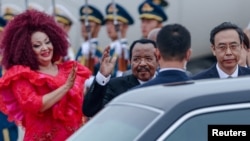Concern is growing in Cameroon about 92-year-old President Paul Biya, who has not been seen in public for more than 40 days.
Biya has not yet returned to Cameroon more than a week after state officials said he would be back from Geneva, following rumors of his death. Several groups say Biya's long absence suggests he is not healthy enough to be president.
Biya was last seen in public on September 8, while leaving Beijing, where he attended the Africa-China forum in the company of world leaders, a few of his collaborators and his wife, Chantal Biya.
Civilians say they suspect Biya is not in good health and is receiving treatment wherever he is.
Opposition and civil society groups say Biya should be in the country to lead the nation amid multiple challenges, including a prolonged separatist crisis that has claimed more than 6,000 lives in the country's western regions.
Government troops are fighting Boko Haram terrorists on the northern border with Chad and Nigeria, and rebels are fleeing to eastern Cameroon from armed conflicts in the neighboring Central African Republic.
Tamfu Richard, a human rights lawyer and a member of the Cameroon Party for National Reconciliation, or CPNR, said he has delivered a petition to National Assembly Speaker Cavaye Yeguie Djibril to inform Cameroon's constitutional council of what he says is a vacancy created by Biya's absence.
"I am simply requesting the president [speaker] of the National Assembly to exercise a constitutional right, which is to refer the vacancy [Biya's long absence] to the constitutional council,” Richard said. “According to the [Cameroon] constitution, the seat of institutions is in Yaounde, and if the president of the republic is out of Cameroon, not on an official visit or for justifiable reasons, it could be that the president of the republic has absconded from his place of work."
VOA could not independently verify if Richard’s petition has been received by the speaker of the national assembly, but copies of the document have been widely circulated on social media.
On October 9, government officials said social and mainstream media reports that Biya was dead were unfounded. They said Biya was alive and in excellent health and was to return to Cameroon soon.
When reports aired calling for Biya's whereabouts to be made public and saying civilians want to see their president, Territorial Administration Minister Paul Atanga Nji banned the media from discussing Biya's health. Nji ordered authorities to monitor all media to make sure violators are charged for illegally discussing top security issues.
Ndi Eugene Ndi, president of the Yaounde chapter of the Cameroon Association of English Speaking Journalists, or CAMASEJ, says most media ignore the ban.
"The press should be free to talk about the president’s health,” Ndi said. “The citizens have to know where the president is through the media."
Biya has ruled Cameroon for more than four decades. Opposition parties say he rules with an iron fist and wants to keep power until he dies. Biya has always claimed he won all elections after he constitutionally took power from Ahmadou Ahidjo, Cameroon’s first president, in 1982. Ahidjo resigned after complaining of his failing health.




